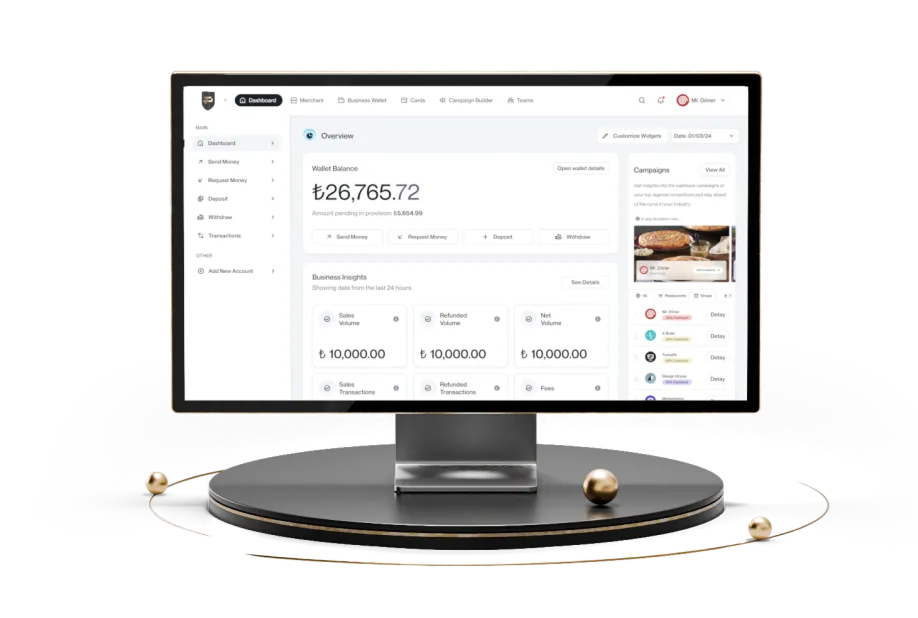Step-by-Step Guide to Applying for a Mortgage in Turkey
For many, purchasing a home is a major financial decision, but mortgage loans help simplify the process. This type of loan provides financing under structured repayment terms, using the home you want to buy as collateral. In this article, you’ll learn everything you need about mortgage loans and find essential guidance for your application process.
What Is a Mortgage?
A mortgage loan is an essential financial tool that facilitates homeownership. Banks or financial institutions offer this loan, allowing individuals to purchase a home with structured repayments. The purchased property is collateral, and the bank holds a lien on the home until the loan is fully repaid. If the borrower fails to make payments, the bank can sell the property to recover the debt.
The loan amount is typically determined as a percentage of the property's appraised value, and interest rates vary between banks. If you're unsure about interest rates, our guide on "What Is Interest? Types, Effects, and Implications" can help clarify the topic.
Borrowers must pay the remaining balance of the home’s price as a down payment. Income, credit score, and payment history are evaluated when applying for a mortgage. Additionally, the legal status of the property, its completion level, and compliance with regulations are also considered.
What Are the Benefits of a Mortgage?
Mortgage loans provide financial flexibility, making homeownership more accessible. Key benefits include:
Early Homeownership Opportunity
With a mortgage, you can own a home without accumulating much savings. Instead of paying rent, you can make monthly payments toward owning your property.
Long-Term Repayment Plan
Mortgage loans are usually offered with long-term repayment options, making it easier to manage debt by spreading payments over an extended period.
Lower Monthly Installments
Since mortgage loans are long-term, monthly installments are generally lower, helping you better manage your budget.
Fixed Payments
One of the biggest advantages of a mortgage is that monthly payments remain fixed throughout the loan term, simplifying financial planning.
Tax Benefits
Sometimes, mortgage loan payments may be tax-deductible, or certain tax reductions may apply, helping you lower overall costs.
Investment Value
Real estate investments generally appreciate over time. This is especially true in growing cities, making property ownership a potentially lucrative investment.
Paying a Mortgage Instead of Rent
For those currently renting, a mortgage can be a smart alternative. Instead of paying rent, you can use a similar amount to own a home.
How to Apply for a Mortgage?
Here are the steps to follow when applying for a mortgage:
Select the property you wish to purchase. Banks provide loans based on a percentage of the property's appraised value, so ensure you have the necessary down payment ready.
Gather the required documents for your application.
Choose the right bank that offers the most favorable loan terms.
The bank will arrange a property appraisal report to determine the home's market value and influence the approved loan amount.
Once the report and documents are reviewed, loan approval and contract signing occur.
Following approval and contract signing, title deed transactions are completed at the land registry office.
Once title deed procedures are finalized, the bank disburses the loan, and your repayment process begins.
The bank retains a lien on the property until the mortgage is fully paid off. The bank reserves the right to sell the home if payments are not made.
What Are the Requirements for a Mortgage?
To qualify for a mortgage, applicants must meet certain criteria. Although specific requirements vary between banks, general conditions include:
- Being at least 18 years old and not exceeding 70 years old at the end of the loan term
- Having a stable and verifiable income
- Maintaining a good credit score
- Providing a down payment
- Using the purchased home as collateral
- Submitting identification, proof of residence, and proof of income
Before applying, you should check the specific requirements of the bank you intend to apply to.
What Documents Are Required for a Mortgage?
Document requirements vary based on employment status and income sources, but generally include:
Identification Document
Original and copy of a national ID, passport, or driver’s license
Proof of Address
A residence certificate or a recent utility bill (water, electricity, gas, or phone) issued in the applicant's name
Proof of Income
Salaried employees: Payroll slip or employer-certified income document
Self-employed individuals: Tax certificate
Business owners: Tax certificate or Trade Registry Gazette listing the company
Real estate income earners: Property title deeds (original and copy) of rented properties
Title deed or purchase contract for the property being financed
How Long Does the Mortgage Process Take?

The mortgage application process varies between banks and depends on the applicant’s financial profile. If all steps proceed smoothly, the process can take 5 to 10 business days. However, factors like banking procedures, applicant financial status, and completeness of documents can affect the timeline.
Key Stages of the Process:
Pre-Approval Process
The bank evaluates your eligibility based on its criteria. Some banks provide instant approvals, while others take longer. Submitting complete and accurate documents speeds up this step.
Property Appraisal
An appraisal report is prepared to determine the property’s market value. This step generally takes 2-3 business days but may vary.
Loan Approval and Contract Signing
After reviewing the appraisal report and necessary documents, the bank finalizes loan approval, and a contract is signed. This usually takes 1-2 business days.
Title Deed Transactions
Following loan approval, the title deed office processes the sale and mortgage registration. Depending on workload, this takes at least 1-2 business days.
How Is a Property Appraisal Conducted?
A property appraisal is a detailed assessment carried out by certified experts to determine a real estate asset’s market value. This process is crucial for banks when deciding on the loan amount.
Steps of the Appraisal Process:
Official Records Review
The appraiser checks land registry and municipal records for legal status, ownership details, zoning compliance, and any encumbrances like liens or foreclosures.
On-Site Inspection
The appraiser visits the property and evaluates key aspects:
Location: Proximity to public transport, schools, hospitals, and commercial centers
Building Condition: Age, number of floors, construction quality, materials, and maintenance
Surroundings: Infrastructure, noise levels, views, and environmental risks
Market Analysis: A comparison of similar properties' sales and rental values in the area
Appraisal Report Preparation
Based on the collected data, the appraiser prepares a detailed valuation report, which includes the property’s market value and influencing factors. This report is then submitted to the bank to proceed with the loan process.
Frequently Asked Questions
Who can get a mortgage loan?
Anyone over 18 years old with a stable income and sufficient credit score can apply. Requirements vary by bank.
How is a mortgage loan utilized?
Once approved, the loan is disbursed with the purchased property as collateral, allowing the buyer to complete the purchase.
Sources: 1.
The information provided in this blog is for general informational purposes only and does not constitute legal, financial, or investment advice. Readers are advised to seek professional guidance for their specific circumstances. Decisions based on this content are at the reader’s discretion, and Papel Elektronik Para ve Ödeme Hizmetleri A.Ş. assumes no liability.

